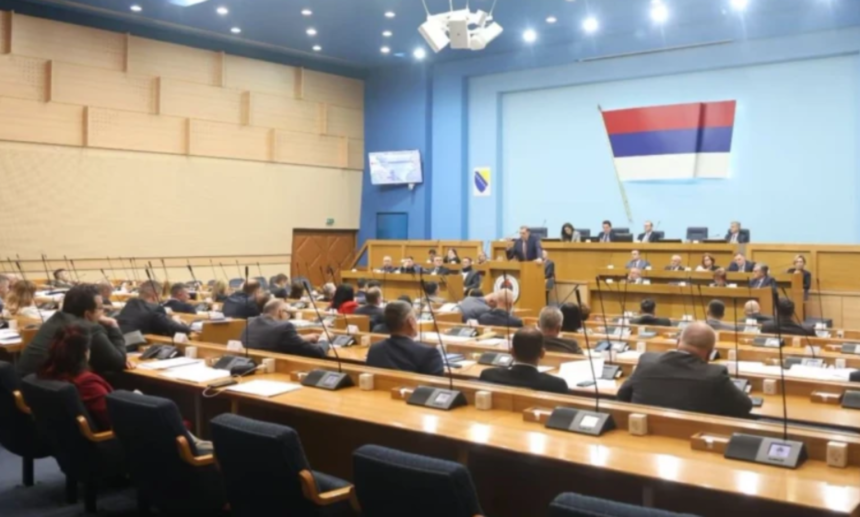The Parliament of the Republika Srpska approved on Thursday laws that unconstitutionally prohibit the activity of Bosnia and Herzegovina’s judicial and investigative institutions in this entity.
With the approval of the draft law on non-implementation of laws and the prohibition of the activity of state institutions, the work and actions of the Court of Bosnia and Herzegovina, the Prosecutor’s Office, the State Investigation and Protection Agency (SIPA), as well as the High Judicial and Prosecutorial Council of Bosnia and Herzegovina, are set to be banned in the Republika Srpska.
The unilateral removal of Bosnia’s state competencies in a part of its territory is not in accordance with the country’s Constitution.
The Court of Bosnia and Herzegovina, the Prosecutor’s Office, and SIPA were established based on laws passed by the Parliamentary Assembly of Bosnia and confirmed by the House of Peoples.
According to the Constitution, to be abolished, these institutions would require a decision by the Parliament of Bosnia.
However, the Minister of Administration and Local Self-Government of Republika Srpska, Senka Jujić, in justifying this proposal, stated that according to the Constitution of Bosnia and Herzegovina, “all functions and government competencies that are not explicitly defined as competencies of the institutions of Bosnia and Herzegovina belong to the entities.”
A total of 49 deputies voted for these laws, while three were against. 52 out of 83 deputies of the Republika Srpska Assembly participated in the vote.
The approval of these laws came one day after the court ruling against the president of the Republika Srpska, Milorad Dodik, who was sentenced to one year in prison and banned from holding public office for six years by the Court of Bosnia and Herzegovina.
The acting director of the Official Gazette of the Republika Srpska, Miloš Ljukić, was acquitted of the charges.
They were accused of not respecting the decisions of the High Representative, Christian Schmidt.
Before the announcement of the decision, the leadership of the Republika Srpska had threatened with “radical decisions” and a withdrawal from all Bosnian institutions if Dodik were to be convicted.
The laws were approved the night before by the Government of the Republika Srpska and then sent to the Parliament of the entity.
With the changes made to the Penal Code of the Republika Srpska, “disrespecting or failing to implement the decisions of institutions or bodies of the Republika Srpska” is considered a criminal act.
Violations are punishable by prison sentences ranging from six months to five years, as well as preventive measures prohibiting the exercise of the profession.
Before the parliamentary session, the president of the entity, Milorad Dodik, declared that the Republika Srpska “will oppose the activities of the Court and Prosecutor’s Office of Bosnia and Herzegovina.”
The Minister of Justice of the Republika Srpska, Miloš Bukejlović, stated that the changes were made “due to the need to protect the institutional order” and aim to “strengthen the accountability mechanism” for individuals holding public office in the Republika Srpska and at the Bosnia and Herzegovina level.
The Parliament also approved the draft law for the High Judicial and Prosecutorial Council of the Republika Srpska, which envisions the creation of an organ that would appoint judges, prosecutors, and other judicial officials in this entity.
In Bosnia and Herzegovina, there is a state-level High Judicial and Prosecutorial Council that appoints judicial officials throughout the country, except for constitutional judges.
The majority in the Republika Srpska Assembly also supported the Law on the Special Register and Transparency of Non-Profit Organizations’ Work.
This law envisions the creation of a Special Register of non-profit organizations established in the Republika Srpska that receive financial support or other assistance from foreign entities and engage in political activities, classifying them as ‘foreign agents.’
Although the ruling party claims that these decisions are in line with the Constitution of the Republika Srpska, opposition parties emphasized that these are laws that represent “the desires of one man [Dodik],” with potential “unpredictable and dangerous” consequences for the citizens of this Serb entity.
“What you are doing today is a direct blow to the Dayton Peace Agreement, the Constitution of Bosnia and Herzegovina, and the Constitution of the Republika Srpska,” said deputy Ognjen Bodiroga.
The president of the Republika Srpska, Milorad Dodik, urged the deputies to vote for the laws, stating that “the situation is extremely favorable to restore the subjectivity of the Republika Srpska, as guaranteed by the Constitution of Bosnia and Herzegovina.”
Dodik emphasized that the Republika Srpska “has been preparing for this step for years,” particularly highlighting the strengthening of “police capacities.”
Dodik had also warned at the end of January about the draft law on the Special Register and Transparency of Non-Profit Organizations’ Work, also known to the public as the “foreign agents law.”
Such a proposal was withdrawn from the procedure of the People’s Assembly of the Republika Srpska in May of last year after significant pressure from both the domestic and international public.







